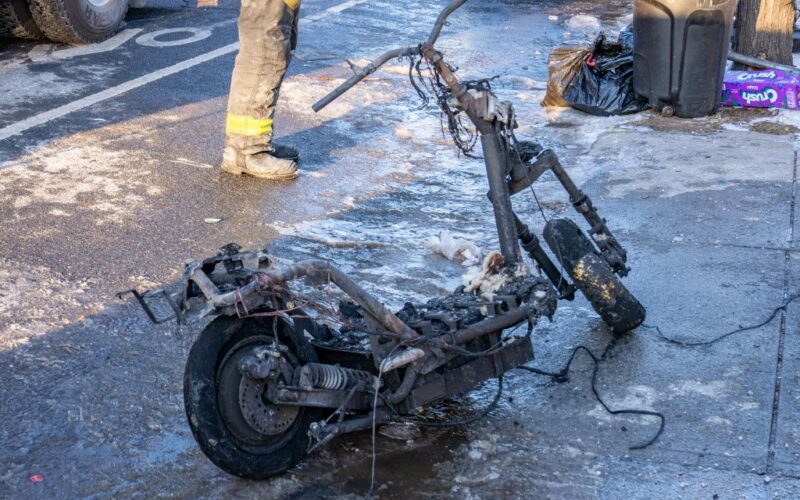On a recent trip, I boarded a subway car with a delivery worker, his e-bike and two lithium-ion batteries. I immediately recognized he was using an uncertified, untested brand of battery and moved to the next car. As the recently retired supervising fire marshal of the New York City Fire Department’s Lithium-Ion Task Force, I know all too well the dangers posed by lithium-ion powered micromobility devices. Unfortunately, even with all the work FDNY and New York City has done to educate the public, the danger still exists for serious injury, particularly during travel on transit.
Lithium-ion batteries can go into thermal runaway, a cycle of uncontrolled self heating leading to an intense fire. Low quality manufactured micromobility devices are more susceptible to failure due to mechanical and electrical abuses.
Soteria Battery Innovation Group conducted a study of e-bike use in the U.S., which revealed the following. Usage For “Deliveries”: 33% experienced a fire, 71% performed their own maintenance and 58% owned a refurbished battery. Usage for “Offroad & Touring”: 22% experienced a fire, 71% performed their own maintenance and 12% owned a refurbished battery. As outlined above, these e-bike users subjected the batteries to abuses, increasing the risk of fire.
Soteria formed a committee to design a new e-bike battery standard based on their survey findings. The research and lab work revealed four safety features not found in any e-bike batteries studied. The final draft of the standard is nearly complete and will recommend the following: use of certified cells, proper cell spacing, busbar requirements, and enhanced BMS system. The standard is supported by 20 companies.
The government and micromobility manufacturers have failed to adopt a uniform national standard. Last May, H.R. 1797, the Setting Consumer Standards for Lithium-ion Batteries Act passed the U.S. House with bipartisan support. Unfortunately, the legislation was not adopted by Congress in 2024.
Luiz C. Ribeiro for New York Daily News
Charred remains of e-bikes and lithium-ion batteries are seen on Madison St. in the Chinatown area of Manhattan on June 20, 2023. Four people were killed and two others left clinging to life after a massive fire ripped through the e-bike store. (Luiz C. Ribeiro for New York Daily News)
Last month, I joined a mobility and battery safety event hosted by Bosch and Propel e-bikes. Bosch builds certified motors and e-bike batteries and Propel sells certified, tested e-bikes. Both the retailer and manufacturer acknowledge many of the issues we have seen in New York: Low quality, uncertified batteries are being purchased as replacement or backup. The lack of an intelligent battery management system, use of defective or incompatible chargers and improper handling or charging are leading to lithium-ion battery failure.
Bosch and Propel shared their concerns publicly about the increased fire risk from low quality uncertified lithium-ion batteries because they believe we need laws in place to protect the public.
Closer to home, NYC Local Law 39 of 2023, required e-bikes, e-scooters and lithium-ion batteries sold, rented or leased in New York City to be certified by a recognized testing lab to the North American UL Standards. Unfortunately, in June 2024, New York State passed similar legislation which allowed those devices to be certified to the UL Standard or European Standard, creating more confusion and debate. More concerning, uncertified micromobility products are not illegal to own, making federal intervention more necessary.
In 2023, the FDNY reported 268 lithium-ion battery fires, with two-thirds of those fires caused by micromobility devices, and more than 50% of the fires occurring when the battery was not charging. In 2024 the number of battery fires increased to 279. Additionally, the fires followed similar patterns, with two-thirds caused by micromobility devices and more than 50% of fires occurring when the battery was not charging. More alarming is that lithium-ion batteries have remained the third most prominent cause of accidental fires in NYC.
The only good news from 2024 FDNY data is a decrease in fatalities from 18 to six. Since 2021, 34 people in NYC have perished in fires caused by a lithium-ion battery. That decrease is linked to public safety messaging with increased enforcement by FDNY’s Lithium-Ion Task Force and the Department of Consumer and Worker Protection. It is important to highlight, the New York City legislation requires compliance to the stricter North American UL Standard. In 2024, several of the lithium-ion battery fires occurred at retail locations and residences where businesses moved operations to avoid inspection.
Even though we had a decrease in fatal fires, the total number of fires increased year over year. The concern about the toxicity of the smoke generated by lithium-ion battery fires still remains. Several fire fatalities from 2023 were a single fire with multiple victims. Research has shown that lithium-ion battery fires produce higher levels of carbon monoxide and carbon dioxide which can incapacitate a person.
In November, I was a fire safety panelist at Soteria’s third annual LithiumSAFE: Battery Safety Workshop in Greenville, S.C. One discussion that stood out most was what the detection application panel shared. Internal manufacturer research has shown during a lithium-ion battery fire the IDLH atmosphere (Immediate Danger to Life & Health) is 10 to 20 times greater in a confined space, such as a subway car.

This is not only a New York City problem, in 2023 the London Fire Brigade which covers a population size the same as NYC, had 279 lithium-ion battery fires with two-thirds of those fires involving micromobility devices. Australia’s New South Wales Fire and Rescue in 2023 counted 285 lithium-ion battery fires. From all indications we are all tracking similar numbers.
In November 2021 in London, a lithium-ion battery e-scooter fire started on a train and continued to burn on the platform at Parsons Green. On Dec. 13, 2021, London TfL banned all privately owned e-scooters, and e-unicycles from their transportation network.
On New Years Eve in 2023, in Toronto on a Sheppard-Yonge subway car an e-bike exploded sending two people to the hospital. Toronto Fire Services conducted an investigation concluding that the e-bike belonged to a delivery worker, the battery was not charging, and the fire was most likely caused by water intrusion at the battery’s courtesy USB charging port. Luckily, the e-bike exploded as the train pulled into the station, avoiding serious injuries. On Dec. 3, 2024, the Toronto Transit Commission voted to ban e-bikes and other lithium-ion battery mobility devices from any TTC vehicle during winter months.
The actions taken by both London and Toronto transit agencies are steps in the right direction as we are all fighting the same battle. However, both measures were reactions to a fire and still lacked complete safety measures for the ridership. Here in New York we have not taken the proper steps to protect passengers from potentially dangerous micromobility devices.
This past October, the Consumer Product Safety Commission issued a consumer warning to immediately stop using a particular brand of e-scooter because of fire and burn hazards. The release goes on to cite seven reports of fires and issues with this e-scooter. The CPSC also states the company has not been responsive to requests for information or a recall. The issue of micromobility lithium-ion battery safety and standards is not being resolved anytime soon.
As New York City welcomes congestion pricing, increasing the number of mass transit riders, action needs to be taken immediately. As the largest public transportation agency in North America, the MTA needs to proactively ban all micromobility devices from their transportation network. This necessary action may be the final spark that manufacturers and government needs to adopt a unified and stringent standard to keep riders, passengers and the public safe from lithium-ion powered micromobility devices.
Orlando retired in 2024 from the FDNY with 27 years of service. He was supervising fire marshal of the Lithium-Ion Task Force and director of training for the Bureau of Fire Investigation. He founded Orlando Safety Solutions Inc. and continues teaching, consulting and speaking about lithium-ion battery safety, Fire Service challenges and solutions.








